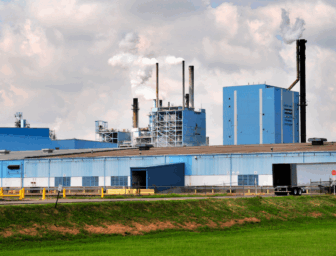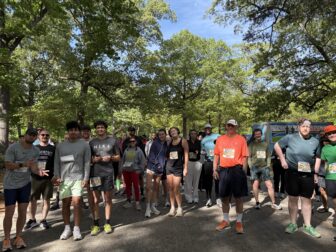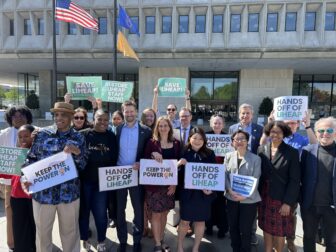During a presentation at City Hall today, the Sierra Club and Chesapeake Climate Action Network celebrated Mayor L. Douglas Wilder
FOR IMMEDIATE RELEASE
CONTACT: Linwood Norman 646-0434 or 241 9398
Sierra Club and Chesapeake Climate Action Commend Mayor Wilder for Signing Climate Protection Agreement
RICHMOND DESIGNATED AS ONE OF NATION’S ‘COOLEST’ CITIES
During a presentation at City Hall today, the Sierra Club and Chesapeake Climate Action Network celebrated Mayor L. Douglas Wilder’s commitment to reduce the City’s global warming pollution by putting into place local energy solutions that reduce energy use and save taxpayer dollars.
The two environmental groups lauded the Mayor for signing the U.S. Mayors Climate Protection Agreement which seeks to reduce global warming. The Mayor joins more than 283 other mayors nationwide who favor innovative local energy solutions such as cleaner car fleets and other energy efficiency and renewable energy practices.
“There’s no question that we must quickly focus our attention toward promoting a cleaner environment and more fully utilizing the energy-efficient technologies that are available,” said the Mayor. “We can no longer ignore the effects of global warming because the consequences will be devastating unless we begin to take the appropriate actions.”
So far, mayors representing 43 million Americans in 39 states have signed the Agreement, pledging to reduce global warming carbon dioxide pollution in their cities to 7 percent below 1990 levels by 2012. For more information about the Agreement, go online to www.ci.seattle.wa.us/mayor/climate.
“Mayor Wilder is to be commended for his leadership in curbing the city’s global warming pollution,” said Tyla Matteson, a volunteer with the Sierra Club. “If we are going to meet our pollution reduction goals by 2012, we will need to expand our existing package of energy and taxpayer-saving solutions to promote more fuel-efficient vehicles, make our buildings more energy efficient, and invest in renewable energy methods.”
“Local officials and citizens can make a difference, even on an issue that has global implications,” said Don Giecek, CCAN’s Virginia Campaign Coordinator, “and Mayor Wilder’s commitment is moving Richmond, our Capital City, in the right direction. It is now time for everyone in Virginia to make similar endorsements to promote renewable energy practices.”
Presently, the City’s energy efficiency and conservation measures include:
- Fleet vehicles use regular gasoline only, at an annual savings of $140,000
- Use of T-8 lights to reduce energy usage, and also motion-detection lights
- Vehicle usage policy that restricts idling for periods of time
- Promotion of ride-sharing, subsidized bus transportation, and building more bike paths
- Purchase of “hybrid” vehicles and training staff mechanics on servicing them
- Installation of long-lasting LED light-emitting devices at new traffic light installations, thereby reducing energy consumption by 80 percent
- Computerized, energy-efficient HVAC systems
- Timing of stop lights to reduce stops, producing less vehicles emissions
- Promotion of utility conservation through consumer education outreach
Today’s presentation to the Mayor – the City’s new “cool” designation – is part of the Sierra Club’s national “Cool Cities” campaign to encourage additional cities to begin to take action to help reduce global warming.
The Sierra Club’s new guide, “Cool Cities: Solving Global Warming One City at a Time,” is available online at www.sierraclub.org/coolcities as a resource for citizens and local officials who want to reduce energy waste and heat-trapping global warming pollution. The guide features success stories among various cities, such as hybrid car municipal fleets in Houston and Charlotte, energy-efficient street lights and buildings in Salt Lake City and Scottsdale, and renewable energy investments in Waverly, Iowa and Columbia, Missouri.
###




